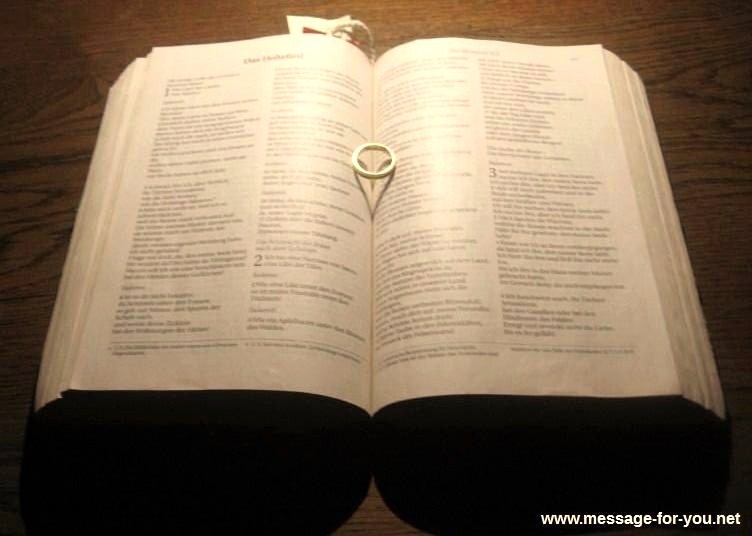Please first read:
Attention, the following translation has been automatically translated. The text may therefore contain errors. It is a temporary rough translation.
But you are free to share the text for non-profit purposes!
This article is one of the “4 steps on the path of discipleship”, see overview:
Next, of course, it’s also important that you know where you’re going. Jesus gives you the directions, so to speak. These directions stand for the Bible or God’s Word. Because on your way with Jesus you need clarity about His will for your life and in certain (life) areas.
For some people, the Bible is just an old “dusty” history book or even just a made-up storybook. Maybe you see the Bible that way too. And maybe you have read it or heard texts from it (e.g. in a church, in religious education at school etc.) and just found it boring.
Or maybe you’re one of those people who read the Bible with serious interest but just didn’t understand it. There may have been passages that you found contradictory. And then you put the Bible aside and stopped reading the Bible.
If that’s the case for you, then we would also like to explain to you why reading the Bible seemed so tedious to you.
What the Bible is, why you need it and how to read it correctly, you will learn in the following.
“What is the Bible?”
The Bible is a very special and unique book.
Because the Bible is the written Word of God
The Bible is not a man-inspired book like a novel. Although the scriptures of the Bible were written by humans, the Holy Spirit inspired them to write (cf. 2 Peter 1:19-21).
These writings were written over thousands of years and passed on to the next generations. And later they were translated from Hebrew and Greek into many other languages. The translation process continues to this day as there are an estimated 7000 languages in the world.
Perhaps you are wondering whether the truth content of such an old book is still correct and whether some of the texts in it have not been changed, supplemented or falsified. But God is able to protect His Word from oblivion and counterfeiting. He watches over His Word (cf. Jeremiah 1:12).
However, there are several Bible translations today, some of which have been translated very loosely to fit today’s language. Unfortunately, as a result, some Bible passages have been changed in such a way that their original statements are expressed less and sometimes even differently. Therefore it is good if you choose a Bible translation that is close to the original text. Under the section “Look for a Bible translation that is close to the original text” you will find recommended Bible translations.
“But what about people who have never heard of the Bible?”
The Bible has been translated into many languages and distributed to most parts of the world. But there are still peoples who have never heard of the Bible. Either because it has not been translated into their language, because the message of Jesus has not yet been proclaimed in their environment or among their people, or because the Bible has been banned in the country and the Christian faith is being persecuted.
But God gave everyone free will. And that includes the decision between good and evil, for or against God. Even if these people do not have a Bible, they can decide for or against God with their free will and their conscience. You can read more about this in another article we wrote: “What about people who have never heard of the gospel?” (Coming Soon)
You may be thinking, “But I have a Bible and I’ve read it so many times, but I just don’t get it!” That’s because the only way to understand the Bible is through the Holy Spirit.
The Holy Spirit will decipher the word for you
And He tells you, so to speak: “I will explain to you how to read the Bible. I’ll explain to you what it means.” And suddenly it’s like when you see a light and you realize: “Hey, suddenly everything is clear to me!” And you can also ask the Holy Spirit to explain some things to you: “What does this text mean? And what does it mean for me personally?” He then brings the Word to life for you.
The thing about the Bible is that you can’t understand it without the Holy Spirit. Without revelation from the Holy Spirit, it is like reading a history book or a novel. You are not in contact with the author. It is different with the Bible. The Holy Spirit wants to bring you into living contact with Him, the Creator Himself.
When you have given your life to Jesus , the Holy Spirit has come into you at that moment and remains in you. Because you have then become a child of God, you will also be able to love God (from spirit to spirit) more and more to recognize.
The Holy Spirit also brings the Bible text to life for you. You can compare it to a 3D film. Perhaps you know such 3D films for which you need special glasses in order to be able to view them so vividly. Without these glasses you can see the film blurry and no clear outlines. But when you put on the 3D glasses, the film becomes vivid and close enough to touch. It is similar when the Holy Spirit brings a Bible text to life for you. It’s like putting 3D glasses on you. Suddenly you recognize everything and it can be experienced. Suddenly it’s not just a book anymore. And then the connections become clear, for example that the texts in the Bible are not contradictory. And that God Himself speaks to you through the text.
Jesus is the Word of God personified
In John 1:1-14, Jesus is referred to as the “Word” through which the world was created. In the last book of the Bible, Revelation, Jesus is referred to as “The Word of God.” So Jesus himself is the word of God in person. In 1 John 1:1 (NLT) He is also called the “Word of Life”. That is why Jesus also said to the scribes in reference to the Scriptures from the Old Testament:
“You search the Scriptures because you think you have eternal life in them; and it is they who testify of me. And yet you will not come to me to receive life.”
(John 5:39-40 SLT)
The whole Bible speaks of Jesus. In the Old Testament He was announced as the Messiah, in the New Testament He appeared as a sinless man and in Revelation His second coming is announced.
Although the Old Testament scriptures already testified about Jesus, many scribes did not recognize Him as the Messiah. They could have recognized Him, but they had closed their hearts. That is, they had read the Scriptures only with their “heads” but not with their “hearts.” They knew the scriptures by heart, but they lacked a living relationship with God.
It’s not about a relationship with the Bible, but with God Himself
It is right to know the Bible well and to memorize Scriptures. It is also correct if you know what the Bible says on a certain topic. But none of this replaces your personal relationship with God.
More on that in the next question:
“Why do I need the Bible?”
We should be careful not to be like the scribes who cultivated their Bible knowledge but not their relationship with God.
First and foremost, you need the Bible for your relationship with God
But how can it be that one can know the Bible and yet not know God?
Here is a simple example: Now imagine a person you know personally and like very much. Maybe a good friend or girlfriend. Or your brother or sister. Maybe your spouse. This person wrote an autobiography. Even a stranger can now find out all sorts of information about them: birthday, school education, CV, hobbies, school grades, favorite books,… Maybe the reader will say at the end: “Now I know the person too!”
But does he really know her? Does he know her like you know her, in a familiar way? Does the reader know what her voice sounds like? How does a hug from her feel? What is it like when you laugh together? How much fun do you have in a leisure activity together?
A stranger cannot “know” any of this if he only knows the bare information about the person.
It’s the same with the Bible. The information in it tells you a lot about God, but it is there to lead you into an encounter with God!
In another article on our website, “Wie bekomme ich eine persönliche Begegnung mit Jesus?”(in Geman, How Can I Have a Personal Encounter with Jesus?) you can also find more about walking in the Spirit in God’s presence.
The Bible reveals God’s character, nature, and will
As already said, you need the Bible to see what God’s character and nature is like and what His will is for us humans in different areas. All this information is there to help you in your relationship with God, in dealing with your fellow human beings, in everyday life, etc.
Because God’s character, nature, and will are revealed to you through the Bible, you also easily discern what His will is in a personal matter. It’s like turning on a flashlight on a dark path and the beam of light will show you the way. But without God’s guidance, we’re groping in the dark. In Psalm 119:105 (SLT) it says aptly:
“Your word is a lamp to my feet and a light to my path.”
God not only speaks through the Bible,
but it is a standard for prophetic impressions
God speaks through the Bible, but also through impressions such as mental or acoustically audible words, through images, visions and dreams. He can also speak to you through other people.
The impressions must not contradict the written Word of God. We know piecemeal (cf. 1 Corinthians 13:9). And in 1 Thess. 5:19-21 (SLT) it says:
“Do not dampen the spirit!
Don’t despise prophecy!
Check everything, keep the good ones!”
The Bible is infallible and the standard by which we test prophetic impressions. Because prophetic impressions can be influenced by our own views, experiences, our image of God, etc. Therefore, you must examine whether an impression is true to the Bible and to God’s character and nature. Testing is not difficult when you get to know God better. It’s like a friend’s familiar voice. With time, you will more easily recognize what his voice sounds like and what he is like (see John 10:4-5).
You will also find explanatory articles on this topic “God’s speeches” on our website, for example in the article “How does God speak? How can I personally hear His voice?” (in German). There is an overview with further articles on the subject.
Get to know His voice and perceive it personally for you! Then you are on the right track. For He is the Good Shepherd and You are His sheep that can hear His voice (cf. John 10:27). You want to follow Jesus. He is the Good Shepherd and you want to hear His voice. You want to know what else He has planned for you personally (eg your personal vocation). You want to know what He says about you (ie your identity in Him).
The Bible is full of good promises for us
In the Bible you can also read what God’s promises are for us, His children. For example healing, spiritual authority over the enemy and many other gifts from the Holy Spirit (eg spiritual gifts). We need to be aware of what we are entitled to as children of God.
In the article Spoken and Sung Bible Verses on Various Topics (in German) (from our other website Prophetenschule.org) you will also find Bible passages on specific topics.
The Bible is a weapon in spiritual warfare
We do not fight against “flesh and blood,” but against spiritual powers that rebel against God (see Ephesians 6:12). The Bible is also our “sword” in spiritual warfare, as described in Ephesians 6:17 and Hebrews 4:12.
The devil is a liar (cf. John 8:44). He wants to tell us lies, eg about God. Therefore it is important that we stand on the truth, on God’s Word. Jesus, too, was tempted by the devil during His time as a man, and He successfully resisted the devil with the Word of God (cf. Luke 4:1-13).
“How do I read the Bible correctly?”
Now we would like to give you a few tips for reading the Bible.
Look for a Bible translation that is close to the original text
Already have a Bible? And if so, also in a good translation of the Bible?
When it comes to German Bible translations, we particularly recommend the Schlachter 2000 Bible translation because it is close to the original text and yet easy to read.
Other German Bible translations based on the Textus Receptus: Elberfelder, Luther.
For English Bible translations, we recommend the Bible translations Amplified, King James, English Standard Version, New International Version, which are close to the original text.
Unfortunately, we are not (yet) familiar with Bible translations into other languages. Please inform yourself about this (e.g. on the Internet).
Under the following link you will find a large overview of where you can order a Bible or individual parts of the Bible (e.g. a New Testament). There are also links where you can request a free Bible: Overview: Where you can order a Bible + Free Bibles and Parts of the Bible
Start with the New Testament
We recommend that you read the New Testament first. Because in it you will immediately learn more about Jesus and what He taught the disciples. It is good if you start with one of the four books of the disciples Mark, Luke, Matthew and John. These books are also called the “Gospels”. Each of the disciples tells of the gospel, the message of Jesus.
We personally recommend that you start with the Gospel of John. It’s very profound but not difficult to read. It is a good starting point because it contains many basics for a life with Jesus: For example, a conversation between Jesus and the scribe Nicodemus, in which Jesus explains to him how one can really be saved (In John 3). About unity with Jesus (In John 15) and about unity with Jesus the Father, the Holy Spirit and believers (In John 17) and much more.
Ask God to encounter you there
When you read the Bible, make yourself aware that God also wants to meet you in it. In practical terms, this means that when you read a text in the Bible, it is better not to read it too quickly, but to “internal” what you have read. Take your time with that. You can also read a sentence several times and think about it or take it to prayer. Ask God to lead you into an encounter with Him. Example: Read John 15 calmly and ask Jesus to reveal to you the real unity with Him.
Also, here are a few more suggestions to “meditate” (ie, internalize and go in with the Spirit) on God’s goodness:
God’s peace
(e.g. John 14:27)
God’s love
(e.g. Romans 5:5)
God’s joy
(e.g. Zephaniah 3:17)
God’s grace
(e.g. Psalm 86:15)
God’s forgiveness
(e.g. 1 John 1:9)
etc. …
Talk to God about the Bible text
You can also pause from time to time and ask God what the scripture you are reading means. Or if He wants to tell you something personal in it. Here are a few suggestions on what to ask God:
“What does this Bible text mean?”
(While reading, if you don’t understand the text, something is unclear etc.)
“What does this Bible text mean for me personally?”
(As you read. Ask God if He has something personal to say to you about this. Of course, He will not give a prophetic word for every sentence in the Bible.)
“Which Scripture (or book or chapter of the Bible) should I read?”
(Again, it may be the case that God does not always show you a “certain” Scripture. But it can sometimes happen that He leads you to a certain Bible text.)
“Would you like to encourage XY (another person you know) with a specific Bible verse?”
(You can also ask God if He wants to encourage another person with a word from the Bible. Maybe He will give you a passage from the Bible, maybe also prophetic impressions.)
etc. …
Different ways to internalize the Bible text
There are different ways in which you can internalize a Bible text. Here are a few suggestions:
You can either read the Bible text silently.
Or you can say it out loud.
When you read the Bible, you also hear it acoustically and this can have the advantage that you can better remember or internalize the spoken text. In addition, words have great power and it is good if you speak the words of the Bible. See also the Bible verses about (the power of) words (in German) article (from our other website Prophetenschule.org). You can also say the statements of the Bible out loud or in your own words, eg “I am a new creation in Jesus” (according to 2 Corinthians 5:17).
You can have someone else read the Bible text to you.
For example, when you meet other Christians and read the Bible together. You can also use an audio Bible (or “audio Bible”). They are available as CDs in stores or as audio files on the Internet.
You can read the Bible text together with other Christians.
You can also ask God the questions mentioned above. Or you read Bible texts on a certain topic etc.
You can even try singing a Bible text.
The Psalms in the Old Testament were originally hymns. You can sing a psalm in your own way and worship God with it too. Psalm 23 lends itself well to this. Or instead of psalms, other Bible texts (e.g. from the Song of Songs).
You can also creatively design a Bible text.
For example, you can draw a picture from a single sentence or even from a whole chapter that visually expresses the text. Or you paint what God told you in it. A picture can make you aware of the Bible text in a completely new way. Example: The vine and the branches from John 15.
Instead of painting pictures, there are also many other creative ideas: A collage of magazine clippings, something made of clay, a mind map (a kind of collection of ideas from individual words), etc.
You can also internalize a Bible text while walking.
Maybe even in a suitable place, for example in John 15 in a vineyard.
“How often should I read the Bible?”
You may be wondering how often you should read the Bible. There is no information in the Bible as to whether one should read it daily and how much one should read it.
However, in the New Testament, Jesus instructed the Jews who had believed in Him and His disciples to “keep in the word” (cf. John 8:31-32; John 15:7). Staying true to His Word doesn’t necessarily mean reading the Bible “as much as you can.” Nor does it necessarily mean reading it for several hours every day. For if such rules were universal, we could easily end up like the scribes who read the Scriptures “much” and “often” but found no nourishment from the Holy Spirit in them. As explained earlier, they had a religious zeal that did not help them in their relationship with God. So it can’t be what Jesus means by that.
Instead, Jesus wants us to have a living relationship with Him, and that’s what it’s all about. For he himself is the word and the truth in person. In the Bible you can read how He is and what His truth is. And that should lead you into the encounter with him.
That means practically: If you spend time with Jesus, then you can go to him inwardly or in spirit. And He really leads you into the truths of the Word. It can happen, for example, that unity with Him is revealed to you, as it is written in the Word, e.g. in John 17.
This is what is meant when Jesus says that we are to abide in Him and in His Word. It is something we can live and experience again and again. Not out of religious duty, but because His love draws us close to Him and we love to enjoy it.
And since you have a relationship with a person and not with a book, you can also ask Jesus specifically what or how much you should read in the Bible. You will then recognize that in your relationship with him.
Sometimes He may “only” reveal a single Bible verse to you. But that He sheds light on different facets on the basis of this single Bible verse. This is then a greater nutritional value than if you would read several chapters in a row on your own zeal.
It may also be your turn to read one chapter after the other. And if He shows you that, then that’s okay too. It should just always have a spiritual benefit. This means that you are in contact with God.
More tips and help about the Bible
Below are more Bible related articles to click on.
More Bible related articles:
- “Love for the Written Word” (in German)
(From our other website Prophetenschule.org. A similar article on the Bible, as part of the Calling Series.)
- Spoken and sung Bible verses on various topics (in German)
(From our other website Prophetenschule.org. There you will find texts and audio files with Bible verses, also Bible passages on specific topics.)
- “How does God speak? How can I personally hear His voice?” (in German)
(There is an overview of articles on the topic “God’s Speaking”. A supplement to the section “God Not Only Speaks Through the Bible, But It Is a Standard for Prophetic Impressions”.)
- “How do I get a personal encounter with Jesus?” (in German)
(As a supplement to the section that the Bible should lead to a personal encounter with Jesus.)
- “What about people who have never heard of the gospel?”
(Coming soon. An addendum to the “But What About People Who Have Never Heard of the Bible?” section.)
This article is one of the “4 steps on the path of discipleship”, see overview:
You can also find many other articles on the topic of discipleship/following after Jesus here:








